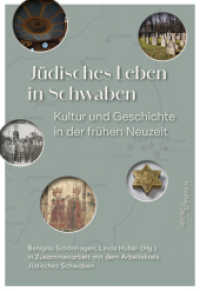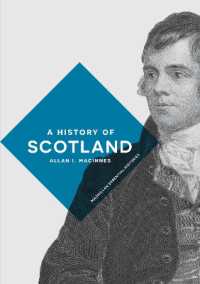- ホーム
- > 洋書
- > 英文書
- > Literary Criticism
Full Description
Studies how women writers shaped long-eighteenth-century educational discourse through literature
Brings together researchers from a range of disciplinary areas: literary studies, history, book history, eighteenth-and-nineteenth-century studies, gender studies, the history of philosophy, the history of education, theological studies, and childhood studies
Focuses its study on the literary forms, techniques and genres deployed by female authors in the period
Examines female educationalists' interaction with: forms such as the novel, the conversational primer, children's poetry, non-fiction textbooks; the Classics; theories of translation; psychology; theories of pedagogy; practices in relation to literacy; and politics
This volume brings together leading critical voices from a range of disciplines to examine the complex and profoundly significant ways in which female literary artists interrogated and advanced educational philosophy and practice. The volume recreates the plurality and non-linearity of the conversations and forms of literary expression that took place in and through this body of educational writing. Literature and education in the long eighteenth century share certain perceived aims: the transmission of knowledge, strengthening of understanding, acculturation, and sometimes empowerment. They also share structural forms: lessons; conversations; letters; dramatizations; confessions; narratives; imitations; sometimes fantasies. In the long eighteenth century, authors of literary texts were often authors of educational treatises who saw their activities in both spheres as interrelated. As such, the parties of teacher and pupil, author and reader frequently overlap. This book provides a historically sensitive understanding of the fraught relations between these parties, drawing attention to the period's debates about authority and freedom as they relate to matters of gender, race, religion, age, and class. This project provides a nuanced understanding of women's literary contributions to the period's strands of educational thought, enabling us to better understand the many and complicated ways in which authors and readers of the period envisaged that literary texts might fulfil, fail, or refuse to fulfil, educational functions.
Contents
IntroductionJessica Lim and Louise Joy
Part I - Moulding Forms1. Important Familial Conversations: Anna Letitia Barbauld, Sarah Trimmer, and Ellenor Fenn - Jessica Lim 2. Reading Poetry for Children in the long eighteenth century - Felicity James3. Women Writing Geography Texts, 1790-1830 - Michéle Cohen4.'What follows': Maria Edgeworth's works for older children - Aileen Douglas
Part II - Acknowledging the Past1. Imitation and Translation: L.E.L. and E.B.B. - Jennifer Wallace2. 'Wisdom consists in the right use of knowledge': Socrates as a symbol of Quaker pedagogy in Maria Hack's Grecian Stories - Rachel Bryant Davies3. Bluestocking Epistolary Education: Elizabeth Carter and Catherine Talbot - Jack Orchard
Part III - Responding to the Present1.Learning through laughter: Sarah Fielding's life lessons - Rebecca Anne Barr2. Emotional Regulation: Jane Austen, Jane West, and Mary Brunton - Katie Halsey and Jennifer Robertson3. Staging Women's Education in Two Anti-Jacobin Novels: More's Coelebs in Search of a Wife (1809) and Hawkins's Rosanne; Or, a Father's Labour Lost (1814) - Laura White
Part IV - Shaping the Future1. Pedagogy as (Cosmo)Politics: Cultivating Benevolence in Mary Wollstonecraft's Educational Works - Laura Kirkley2. 'The enemy of imagination'? Re-imagining Sarah Trimmer and her Fabulous Histories - Jonathan Padley3. A Literary Life: A Transatlantic Tale of Vivacity, Rousing Curiosity and Engaging Affection - Lissa Paul








